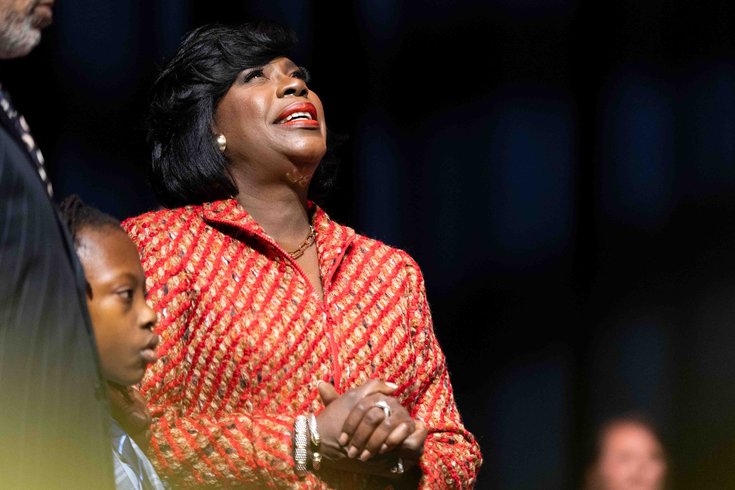
January 02, 2024
 Colleen Claggett/For PhillyVoice
Colleen Claggett/For PhillyVoice
Philadelphia Mayor Cherelle Parker, shown at her inauguration ceremony on Tuesday, has pledged to declare a public safety emergency and to increase police presence throughout the city during her first 100 in office.
Cherelle Parker has unveiled plans for her first 100 days as Philadelphia's mayor.
Parker, who was formally sworn in Tuesday morning at an inauguration ceremony at The Met, released a 9-page action plan outlining her administration's most immediate priorities. The plan includes six areas and 23 specific pledges like boosting police presence in neighborhoods and increasing access to housing, among other goals.
MORE: Mayor Cherelle Parker delivers hopeful message at inauguration, says 'it's on us' to change Philly
Printed copies of Parker's plan were placed on the seats of The Met for guests to read.
"Today, I swear an oath as Philadelphia's 100th Mayor and the first woman to hold the office in 341 years," Parker writes in the letter that opens the document. "I do so with humility, with respect for the 99 who came before me, and with a solemn promise: we will make Philadelphia the safest, cleanest, and greenest big city in the nation with economic opportunity for everyone."
During her inauguration address on Tuesday, Parker said the city will not get bogged down by people she called "expert articulator of problems."
"They are very very very short on delivering solutions," the new mayor said, and she added, "We are going to be laser focused on developing solutions to address our challenges."
The first plank of the plan is public safety, a topic that Parker frequently turned to on the campaign trail. Parker pledged to declare a public safety emergency that will direct the city's new police commissioner, Kevin Bethel, to develop a strategy that uses "every available resource" to stop violent crime.
Parker, a Democrat, also promised to increase the number of police officers on the streets, a policing strategy that she has pushed for since her days on City Council. As both a city councilmember and a mayoral candidate, Parker pitched a plan to hire 300 more beat cops to patrol every neighborhood and acquaint themselves with the residents.
On the campaign trail, Parker expressed her support for stop-and-frisk policing that meets legal standards, drawing criticism from the likes of the American Civil Liberties Union, which says the practice leads to racial disparities and dangerous interactions with police. Parker has promised to have zero tolerance for police who abuse their power.
At her inauguration ceremony, Parker called police officers "guardians, not warriors."
"We can have community policing and we can have accountability," Parker said.
Parker's first 100 days also will focus on "clean and green" initiatives to combat dumping, litter and graffiti. She promised to create a public ticker to document the city's progress on clearing blight and removing abandoned cars, and to expand her PHL Taking Care of Business program, which hires workers to clean commercial corridors in the city.
To increase housing access, Parker vowed to launch a formal review of the Land Bank to speed up the development of vacant and tax-delinquent properties. Her housing plans also include consolidating city-run resources for home improvement, and formally incorporating the recommendations of the Philadelphia Home Appraisal Bias Task Force into the city's planning and development department. Parker convened that task force as a councilmember in 2021 to address the impacts of race in home appraisals; U.S. Census data has shown that 95% of appraisers in Philadelphia are white.
The new mayor also will begin a listening tour with city educators, designed to solicit ideas on hiring and retaining teachers. Working groups will convene to develop new strategies to modernize Philly's school buildings – many have been temporarily shuttered in recent years over asbestos and inadequate air conditioning – and to develop after-school programming. Parker's ultimate goal is to offer students educational or work activities from 7:30 a.m. to 6 p.m. throughout the year.
Perhaps the most robust section of the action plan is focused on business. Parker aims to expand economic opportunity by removing college degree requirements from more city jobs and creating a resource center for recently incarcerated residents to smooth their reintegration processes. She also will require all city departments to submit lists of licenses, certifications and permits under their authorities — and make recommendations on those that can be cut.
The Parker administration will lean heavily on so-called roundtables, including a previously announced intergovernmental group comprising several city councilmembers, state representatives and U.S. Sens. Bob Casey and John Fetterman. The mayor's plan also describes a business roundtable and a faith-based coalition, the latter aimed at reaching "many who would otherwise not interact with City government." The members of those groups have not yet been announced.
Follow Kristin & PhillyVoice on Twitter: @kristin_hunt
| @thePhillyVoice
Like us on Facebook: PhillyVoice
Have a news tip? Let us know.